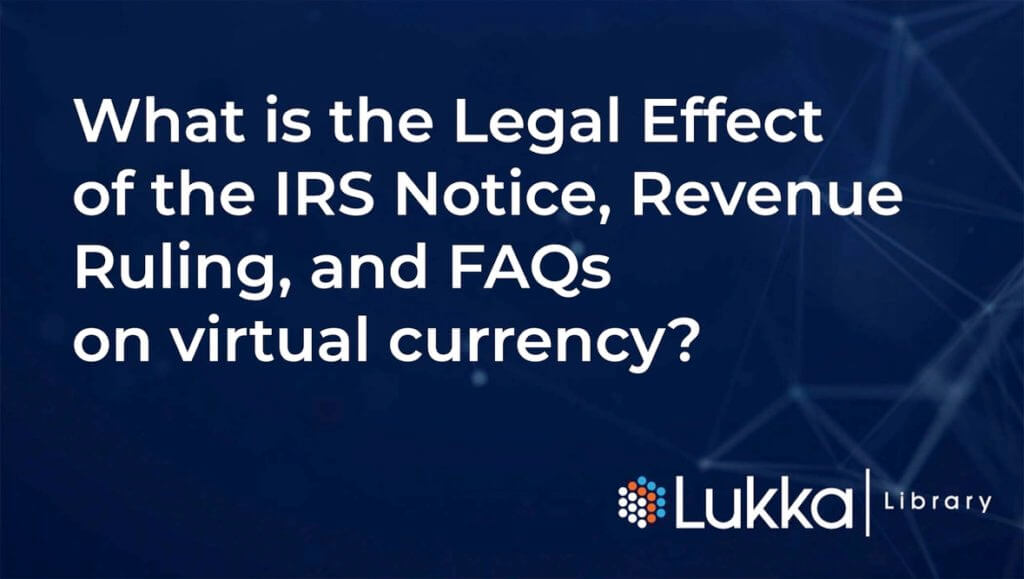Author: David J. Shakow, Professor Emeritus, University of Pennsylvania School of Law1
The discussion in this document reflect legal principles as of January 20, 2020.
None of the legal guidance applicable to cryptocurrency appears in the Internal Revenue Code. The IRS’s first holding, that cryptocurrencies are not currencies for purposes of the special currency rules in the Internal Revenue Code, was promulgated in a “Notice”. Its more recent holding regarding hard forks was presented in a “Revenue Ruling” which was accompanied by a series of frequently asked questions (FAQs).
It is not simple to determine the deference, if any, that a court will give to such guidance from the IRS. Until fairly recently, IRS pronouncements were subject to different standards of review than those of other administrative agencies. However, the Supreme Court has made clear that courts should apply the same rules in reviewing IRS positions that they apply to the pronouncements of other agencies.
Unfortunately, this does not lead to a simple description of how the IRS’s statements in this area will be treated by the courts. Judicial deference to administrative pronouncements is governed by the emanations of a decision by the Supreme Court in a case called Chevron. The precise scope of that decision is far from clear and has generated much attention both from the courts and academics. Moreover, it is subject to regular re-examination by the Supreme Court, with the constant possibility that its precise scope will be changed.
With those caveats in mind, here is a general summary of the current state of the law. If the IRS issues a regulation, and in doing so, complies with the Administrative Procedure Act, courts will almost always defer to the IRS’s position.
When the IRS’s position is stated in anything other than a regulation, the deference that courts will give to it, and the deference that the IRS will claim for it, are not totally clear. Early in 2019, Treasury released a policy statement indicating that it would not argue that anything other than regulation has the force and effect of law, and that it would not seek judicial deference under the Chevron doctrine for those pronouncements. Six months later, the IRS issued a notice nominally concurring with that position, but indicating that the IRS will continue to argue that positions taken outside the formal regulation process continue to have significance that courts should consider.
As indicated above, none of the positions taken by the IRS in connection with cryptocurrency were taken in regulations. Thus, taxpayers can challenge those positions. Certainly, the relative informality of the IRS’s positions in this area make its views less authoritative than they would be otherwise. But it is not clear what effect this difference in the formal authority of the IRS’s stated positions will have. There are significant arguments that can be made against some of the positions that the IRS has taken, particularly its view that hard forks always produce income. The fact that the IRS has stated its position in a relatively less formal document makes it easier for a practitioner to support a taxpayer’s filing position that there is no immediate income from a hard fork. However, those arguments do not appear so strong that they would lead a court to reject the IRS’s interpretations. Even though these less formal positions of the IRS are not strictly binding on the courts, if those positions are not arbitrary or capricious, the courts in the past have normally deferred to the IRS’s interpretations absent a strong reason not to. In the current fairly unclear state of the law and practice regarding cryptocurrencies, it does not appear likely that a court would reach a conclusion different than what the IRS has stated.
Nevertheless, it is significant that the IRS’s positions have not been promulgated in the more formal, and more authoritative, form of a regulation. When a position is taken by the IRS in one of these less formal forms, it is somewhat more likely that the agency will reconsider its position at a later point in time. Based on the somewhat confusing descriptions the IRS has given for current practices in this area, there is certainly an argument that the IRS has yet to fully appreciate all the nuances of practice in this area. Where an agency does not have particular expertise on an issue, the Supreme Court, in reviewing Obamacare, allowed courts more discretion to review the agency’s conclusions.
As the IRS’s sophistication improves, it is likely to attempt a comprehensive approach to the many tax issues that arise in this area. When it does so, it may conclude that it is appropriate to modify positions it has taken in the past. Of course, it is also possible that Congress will, at some point, try to deal with the issues raised by the growing use of cryptocurrencies.
However, absent any changes along the lines detailed above, it can be expected that the IRS’s positions will be the ones most taxpayers comply with and which the courts are most likely to uphold.
1 The statements in this paper represent the views of the author only and should not be attributed to the University of Pennsylvania School of Law. Further, this document should not be treated as legal advice to any reader or to Lukka.





